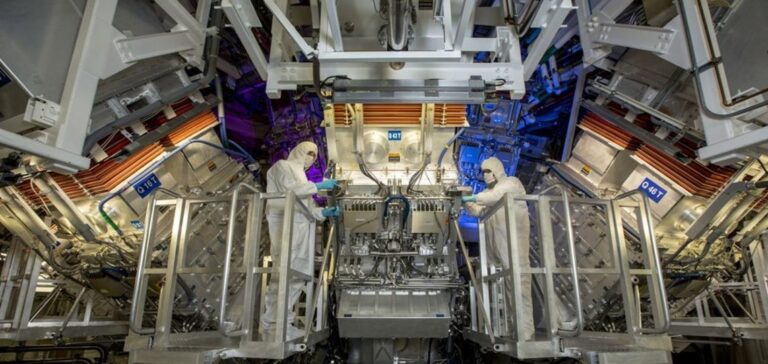Helical Fusion, a Japanese start-up specializing in nuclear fusion, plans to launch the world’s first stable nuclear fusion reactor by 2034.
Using the “helical method”, a magnetic approach developed in collaboration with Japan’s National Institute for Fusion Science (NIFS), the project aims to generate electricity without greenhouse gas emissions or long-lived nuclear waste.
The initiative could potentially transform the energy strategy of Japan, a country heavily dependent on imported fossil fuels. Nuclear fusion differs from fission in its process: two light atomic nuclei fuse together to create a heavier nucleus, releasing a large amount of energy.
Unlike traditional fission reactors, this technology promises energy without the production of long-term radioactive waste.
However, the technical and economic challenges remain numerous.
Current research, while having demonstrated the possibility of maintaining a plasma at temperatures in excess of 100 million degrees Celsius for several thousand seconds, has not yet led to a commercially viable solution.
Investments and Technological Challenges
Helical Fusion has estimated that construction of the pilot reactor, scheduled for 2034, will require an investment of around 1 trillion yen.
This project will build on the 400 billion yen already invested by Japan in the development of nuclear fusion at NIFS.
The high cost of this technology is explained by the need for sophisticated equipment, in particular for the development of high-temperature superconducting coils, essential for maintaining plasma confinement and ensuring reactor stability.
In addition, major regulatory challenges remain.
Implementing such a project requires adapting the Japanese regulatory framework, as well as obtaining multiple construction and safety authorizations.
These regulations are designed to minimize the risks associated with handling extremely high temperatures, and to ensure that all safety measures are in place to prevent incidents.
Impact on Japan’s Energy Security
The success of this project could have major implications for Japan’s energy security.
As a net energy importer, Japan is vulnerable to fluctuations in international commodity prices and geopolitical tensions.
The possibility of producing electricity from nuclear fusion could offer the country greater energy autonomy, reducing its dependence on fossil fuels.
The Japanese government is closely monitoring developments in the field of nuclear fusion, which it sees as an essential component of its energy diversification strategy.
By drawing on the research and development capabilities of NIFS, Helical Fusion hopes to overcome the technical obstacles that have held back the commercialization of this technology to date.
Global Perspectives and Future Developments
The Helical Fusion reactor project is not only of national importance; it also has international implications.
At a time when many countries, including the United States, China and the European Union, are investing heavily in nuclear fusion research, Japan could position itself as a technological leader in this field.
However, success will depend on the company’s ability to meet several major challenges: securing the necessary funding, mastering the complex technology of magnetic confinement, and gaining political and social support for the construction and operation of the facilities.
In addition to these technical considerations, international collaboration could play a crucial role in moving the project forward.
Growing interest in public-private partnerships in the fusion field could also provide funding and knowledge-sharing opportunities, accelerating development towards a commercially viable model.
Foreign investment and strategic alliances will be key to sustaining technological innovation and industrial scale-up.






















